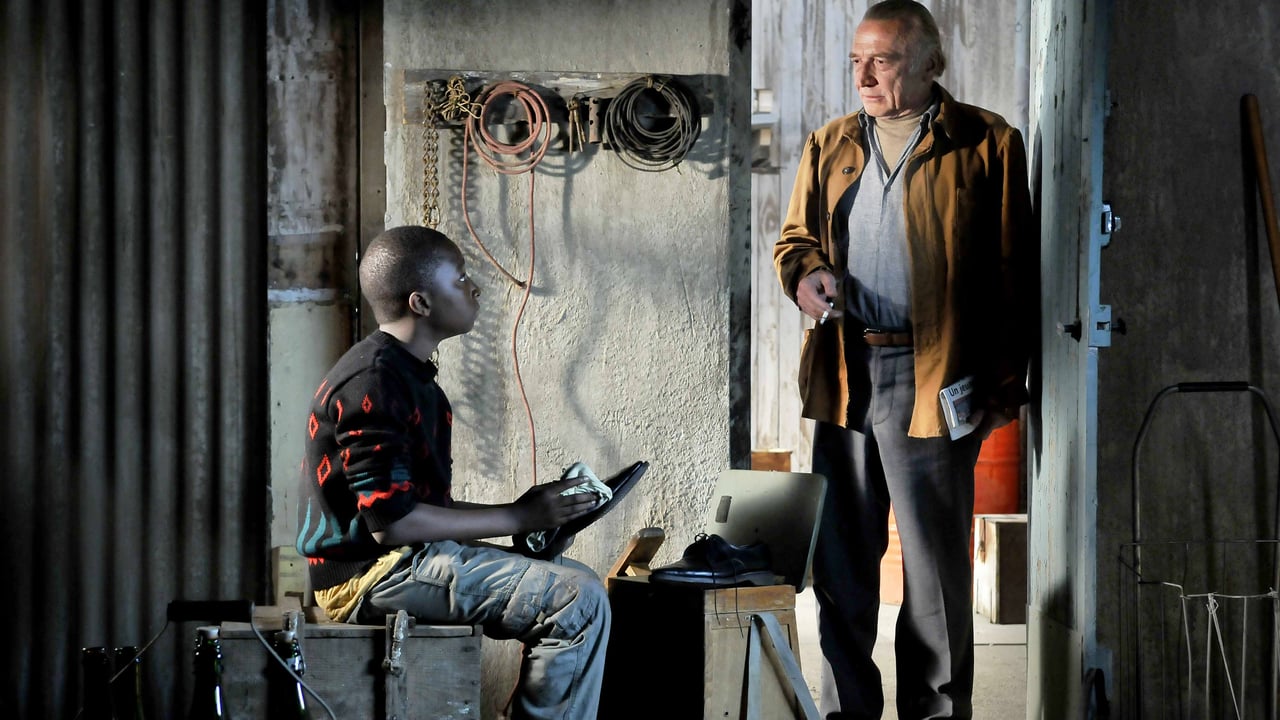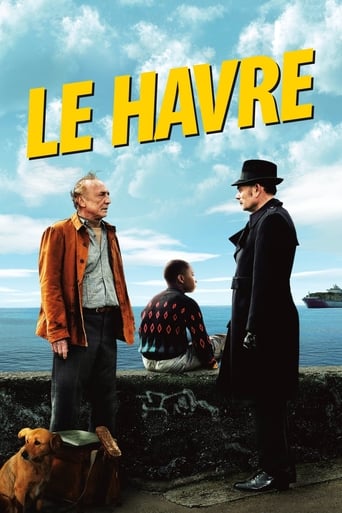

That was an excellent one.
... View MoreSlow pace in the most part of the movie.
... View MoreBetter Late Then Never
... View MoreOne of the best movies of the year! Incredible from the beginning to the end.
... View MoreOnce you see it it stays with you forever. You'll want to show it to the people you love.
... View MoreFrom my new country Australia but where I have spent nearly two third of my life, I really enjoyed this little trip back in France! Although the topic is not that of a holiday since it's about people looking for a better world and so becoming illegal immigrants. But the story concentrates more on one of them.... It's a charming story where people seem to be themselves, regardless of the circumstances, to remain "human beings" above all. It's sweet at time funny. I'm fond of J P Daroussin but did not know the other actors. So in one way it was refreshing but also rewarding to see someone whose acting I enjoy. I have never been to Le Havre so it was not really a trip down memory lane. And I was a little surprised to feel that the period did not seem to match with the year I expected it to be. I researched a little for my own satisfaction and read a very well written review from the New York Times ..."The film itself seems to belong to another era" It certainly did for me I kept struggling to feel whether I was in the 1930 or 40 years latter. It was a gentle ride and I enjoyed it very much.
... View MoreThe director Aki Kaurismäki's films are so dry that I may only describe the characters and their situations if I try to talk about his movies in my writing – and I might get away with my delinquency. His deadpan approach is so simple that you probably do not understand why it is funny until you see it for yourself. For instance, one character in his new film "Le Havre" buys a certain fruit in the middle of the story, and then he walks into the bar to have some conversation with a bar owner. The camera does nothing except simply observes the man sitting on one of the tables and the fruit placed on the table right next to him, but it somehow made me smile.Kaurismäki's films are usually set in the urban area of Finland, and his unhappy characters are stuck in hard time while yearning for the escape from the ennui and dreariness of their daily life, as shown in "Shadows in Paradise"(1986) and "Ariel"(1988). But this time, it is a little different. Set in Le Havre, a French port city in Normandy, he presents us a middle-aged couple content with their poor lifestyle and happy to be together – and he makes a movie warmer and more accessible than before.Marcel(André Wilms) is a shoeshine living in Le Havre(I am curious – how many cities in the world are called "The Harbor"?). He moves around the different places in the city for earning money, but it is not so easy for him to work on these days(the opening scene made me to be conscious about what I was wearing on my feet). While watching him working, I thought he would envy the shoeshines I saw in Seoul, who usually occupy the booths on the streets as their workplace for doing other things besides polishing the shoes. I remember that I once needed my shoes to be polished as soon as possible when I was about to attend the lab colleague's wedding; I went into one of those booths, and the guy did a marvelous job with my old shoes I seldom wore.Anyway, let's get back to the film itself. Marcel does not earn money much, but there is always the place waiting for him whenever the day is over. There are his good working-class neighbours, including the bakery owner who demands Marcel to pay off his accumulating bill while well aware of that he will probably never do that. He tells her he will pay it all when a good chance comes(he mentions about "the inheritance" of his wife), but it is a lie, and both know that. The grocery shop owner across the alley chooses a more direct way – he shuts down the store instantly when Marcel walks to the store, though, as we learn later, he is a nice man, after all.Marcel was once a free-living bohemian who wanted to be a writer when he was young, but now he is settled with his wife Arletty(Kati Outinen – do you remember her far younger self in "Shadows in Paradise" and "The Match Factory Girl"(1990)?) and their dog Laika in their shabby house. We do not know much about how they met in the past(I guess they started as "the best roommates"), but the low-key performances of Wilms and Outinen succinctly conveys us a dry but loving relationship between them.Meanwhile, a group of illegal immigrants from Gabon, who tried to go to London, are found by the police at one of those huge containers at the port after locked in there for days due to their bad luck. One of them, a boy named Idrissa(Blondin Miguel), manages to escape. When he goes to the riverside to have a lunch, Marcel comes across him hiding from the police. He gives Idrissa the food later, and Marcel soon finds himself taking care of him at his house while the newspapers make a big fuss about this shy, quiet, and nice boy.Marcel does more than that to help Idrissa. He goes to Calais to find and meet Idrissa's grandfather who was with him in that container. He even concocts a secret plan to send Idrissa to London where Idrissa's mother lives. While Marcel is absent, Idrissa can take care of himself well, and Laika, who deserves to appear with others in the movie poster, is always near him.Marcel's neighbours also help him, too. Except one petty guy(Jean- Pierre Léaud – remember Antoine Doinel in "400 Blows"(1959)?), his neighbours do not tell anything to the police. Captain Monet(Jean-Pierre Darroussin, very serious with a black suit, a black coat, black shoes, black gloves, and a black hat) seems to be determined to do his job, but Darroussin gives us a subtle hint that Monet does not like what he has to do. Monet can be flexible, and the loose suspense of the film depends on how much flexible he can be.While Marcel is busy with helping Idrissa, Arletty is in the hospital. She knows she has been ill, and she hides that from her husband, but she can't hide it from him any more now, except that her days can be counted. She is sent to the hospital early in the film, so she does not know much about what is going around her husband, but, when Idrissa comes to her at the hospital to deliver the message from her husband, she accepts the message from the boy she barely knows. Outinen expresses little in the face, but this scene is one of the warmest spots in the film along with its charming soundtrack. Later in the story, there is an illegal concert promoted by Marcel and his Vietnamese colleague(Quoc Dung Nguyen) to gather the money for helping Idrissa, and a singer named Little Bob(Roberto Piazza) gets a little showstopper moment with his live performance.
... View MoreThis is reminiscent of Marcel Pagnol's great trilogy Marius, Fanny, Cesar, which was also set in a French port. There are, of course, close to a thousand miles separating Marseilles in the South from Le Havre in the north but both are imbued with a strong sense of community and both address the realities of life and both furnish happy endings. Very little happens here - a group of illegal immigrants are discovered in a container on the docks; one, a young boy, runs away and is befriended by a man who shines shoes for a living; the man's wife develops a terminal illness. A great deal of film time is spent eating, drinking,and talking. The shoeshine man organises a concert to raise money to pay for the boy's illegal passage to England, he visits his wife in hospital. A police Inspector who investigates crime rather than illegal immigrants circles in the background. The boy gets away, the man's wife recovers. It's not unlike lifting a pebble in a rock pool and examining the life going on there. It's a beautiful film, finely acted by an ensemble cast virtually unknown with the exception of the magnificent Jean-Pierre Darroussin as the policeman.
... View More